#salesforce architect certification path
Explore tagged Tumblr posts
Text
#salesforce developer certification roadmap#Salesforce certification path#salesforce architect certification path#salesforce integration architect certification#salesforce integration architect exam questions#how to get salesforce admin certification#remote salesforce developer jobs
0 notes
Text
What Are the Career Opportunities After Completing Salesforce Classes in the USA?

Introduction
In today’s digitally connected world, businesses rely heavily on customer relationship management (CRM) platforms to enhance productivity and streamline communication. Salesforce, the global leader in CRM solutions, has become a central force driving this transformation. As demand surges, Salesforce classes have emerged as powerful pathways to high-growth careers across various industries in the United States.
Whether you're looking to switch careers or upskill for better job prospects, Salesforce certification programs open the door to multiple career opportunities. From Salesforce Administrator roles to consulting and development paths, completing salesforce admin training and placement programs can set you on a lucrative career trajectory.
Why Choose Salesforce as a Career?
Growing Market Demand
Salesforce is used by more than 150,000 companies worldwide, including top firms in the U.S. This widespread adoption has created a robust job market. According to IDC, Salesforce and its ecosystem are projected to create over 9.3 million new jobs by 2026.
High-Paying Roles
Professionals who complete salesforce classes online or attend Salesforce administrator training online often command high salaries. Entry-level roles offer competitive compensation, while certified experts can earn well above industry averages.
Flexible Career Paths
Salesforce training and placement programs don’t just funnel graduates into one track. Instead, they offer multiple roles, including administrative, analytical, developmental, and strategic functions. This flexibility makes Salesforce careers attractive to both tech-savvy individuals and business-focused professionals.
Key Salesforce Certification Programs in the USA
Before diving into career roles, it’s important to understand the types of salesforce certification programs available:
1. Salesforce Administrator Certification
This is the foundation for many roles. The salesforce admin course teaches configuration, user management, data management, and workflow automation.
2. Salesforce Advanced Administrator
Ideal for those who want to build on their admin knowledge, this certification covers more complex business processes, dashboards, and security controls.
3. Salesforce Developer Certifications
These include Platform Developer I and II, focusing on Apex code, Visualforce pages, and Lightning components.
4. Salesforce Consultant Certifications
These roles require functional expertise. Examples include Sales Cloud Consultant and Service Cloud Consultant.
5. Salesforce Architect Certifications
For those seeking leadership roles in designing scalable solutions.
Career Opportunities After Salesforce Classes
1. Salesforce Administrator
Role Overview: Administrators ensure the platform runs smoothly. They handle user permissions, data hygiene, and basic automation.
Skills Required: Configuration, reporting, dashboards, user setup.
Average Salary (USA): $85,000 - $110,000
How Salesforce Admin Training and Placement Helps: These programs provide hands-on skills and job readiness, making it easier for candidates to secure their first admin role.
2. Salesforce Developer
Role Overview: Developers create custom applications using Apex, Visualforce, and Lightning Web Components.
Skills Required: Programming in Apex, understanding of SOQL/SOSL, and integration with third-party apps.
Average Salary (USA): $105,000 - $135,000
How Certification Helps: Completing salesforce trainings that include real-time coding practice can make candidates stand out to employers.
3. Salesforce Business Analyst
Role Overview: These professionals act as a bridge between business users and technical teams.
Skills Required: Requirement gathering, process modeling, stakeholder communication.
Average Salary (USA): $90,000 - $115,000
Placement Insight: Many business analyst roles prefer candidates with a background in Salesforce classes online due to their understanding of workflows and automation.
4. Salesforce Consultant
Role Overview: Consultants work on project implementation, advising clients on best practices.
Skills Required: Deep product knowledge, client interaction, process optimization.
Average Salary (USA): $100,000 - $140,000
Real-World Advantage: H2K Infosys provides project-based training that simulates real consulting scenarios, enhancing job preparedness.
5. Salesforce Solution Architect
Role Overview: Architects design scalable and secure Salesforce solutions.
Skills Required: End-to-end project design, integration strategy, technical leadership.
Average Salary (USA): $140,000 - $180,000
Career Progression: Most architects begin as admins or developers and grow through Salesforce certification programs.
6. Salesforce QA Engineer
Role Overview: QA Engineers test the functionality and performance of Salesforce applications.
Skills Required: Manual and automated testing, test scripts, bug tracking.
Average Salary (USA): $80,000 - $100,000
Certifications Useful: Salesforce classes with QA modules or integration of QA tools with Salesforce can be advantageous.
7. Salesforce Marketing Cloud Specialist
Role Overview: These specialists work on campaign management, email automation, and customer journeys.
Skills Required: Marketing automation, analytics, content personalization.
Average Salary (USA): $95,000 - $120,000
Training Insight: Specific salesforce certification programs focus on Marketing Cloud tools and techniques.
Real-World Applications and Job Market Insights
Diverse Industries Hiring Salesforce Talent
Healthcare: Managing patient journeys and health records.
Finance: Automating customer onboarding and loan processing.
Retail: Personalizing the customer experience.
Education: Streamlining student engagement and enrollment.
Example: Entry-Level to Advanced Career Path
Jane, a graduate of salesforce administrator training online, started as a Salesforce Admin at a mid-sized insurance firm. After gaining two years of experience and completing a Platform Developer I course, she moved into a Salesforce Developer role with a 35% salary increase.
Benefits of Completing Salesforce Training and Placement Programs
1. Structured Learning Path
Salesforce training and placement programs provide a clear, guided approach from basics to advanced concepts.
2. Hands-On Experience
Many programs offer sandbox access, case studies, and real-time projects.
3. Industry Recognition
Certifications are well-respected and often listed as mandatory in job descriptions.
4. Job Assistance
Programs like the one offered by H2K Infosys include resume support, mock interviews, and placement services.
Online Learning: A Game Changer
Why Choose Salesforce Classes Online?
Flexibility to learn at your own pace
Access to updated curriculum
Interaction with expert instructors
Lower costs compared to traditional education
What Makes the Best Salesforce Training Online?
Instructor-led live sessions
Real-world case studies
Community support and Q&A forums
Certification-focused training material
Step-by-Step Guide: Your First Salesforce Job
Step 1: Choose the Right Certification
Start with the salesforce admin course for foundational skills.
Step 2: Enroll in a Trusted Program
Look for salesforce trainings that offer hands-on projects and placement assistance.
Step 3: Practice in a Sandbox
Apply what you learn using a Salesforce Developer Edition account.
Step 4: Earn Your Certification
Pass the exam and display your badge on LinkedIn and your resume.
Step 5: Apply for Entry-Level Roles
Look for job titles like "Salesforce Administrator," "Junior Developer," or "CRM Analyst."
Step 6: Gain Experience and Upskill
Continue with advanced certifications and build a portfolio.
Key Takeaways
Salesforce is a booming field in the U.S. with high demand for certified professionals.
Career options include Admin, Developer, Analyst, Consultant, QA, Architect, and Marketing roles.
Completing salesforce admin training and placement programs boosts employability.
Online salesforce classes offer flexibility and affordability.
H2K Infosys is among the trusted names offering real-world project experience and placement support.
Conclusion
Completing Salesforce classes in the USA can unlock a wealth of career opportunities in tech, business, and consulting. With the right training, certifications, and support, your path to a high-growth career starts today.
Ready to take the next step? Explore your Salesforce future with hands-on training and real placement support at H2K Infosys.
0 notes
Text
How to Start a Career in Salesforce: Roles, Skills & Roadmap

Salesforce is much more than a CRM platform. It's a complete ecosystem that powers over 150,000 companies worldwide in sales, marketing and service. Salesforce's rapid growth is creating a demand for highly skilled professionals. This will make it a very attractive career in 2025. Salesforce has opportunities for all, whether you are a recent grad, an IT professional who wants to change domains or someone with a non-technical education.
Salesforce Implementation Services are also used by many businesses to customize and set up their CRM systems. These services require professionals with skills such as administrators and developers. Consultants are also needed. This blog will walk you through the roles and skills needed to succeed in the Salesforce ecosystem.
1. Why Choose a Career in Salesforce?
High Demand & Job Security: As more companies adopt Salesforce, the demand for certified professionals is increasing.
Diverse Roles: Whether you are interested in coding, analytics or management, you can find a job that suits you.
Competitive Salaries: Salesforce jobs often pay higher than average salaries when compared with other IT positions.
Work Flexibility: Many Salesforce positions are remote or hybrid.
Global Recognition: The Salesforce certifications are recognized and accepted worldwide.
2. Key Roles in the Salesforce Ecosystem
These are the most popular and in-demand jobs:
✅ Salesforce Administrator
Manages user accounts and data. Dashboards, reports, basic automations.
Non-coders with a strong understanding of business processes are suited to this course.
The first job people take on is often one that is suited to entry-level workers.
✅ Salesforce Developer
Create custom apps and automations with Apex (Salesforce’s Java-like programming language) and Lightning Web Components.
You must have programming experience and knowledge.
✅ Salesforce Consultant
Work directly with clients, gathering business requirements and designing solutions.
Combining business analysis skills and platform knowledge.
✅ Salesforce Architect
Designing high-level solutions and overseeing integration across complex business systems.
It is usually a senior position with many years of experience.
✅ Salesforce Business Analyst
This course focuses on gathering requirements, creating user stories, as well as bridging gaps between clients and developers.
Great for people with good communication and analytical skills.
3. Skills Required for a Salesforce Career
🛠️ Technical Skills (based on role)
CRM Basics: Understanding how CRM systems work
Salesforce Platform Knowledge: Familiarity with objects, fields, relationships, etc.
Apex Programming (for developers)
SOQL/SOSL: Salesforce's data query languages
Lightning Web Components: Front-end development for modern Salesforce interfaces
Reports and Dashboards: Creating and customizing analytics
🤝 Soft Skills
Communication and Collaboration
Mindset for problem-solving
Project Management (particularly for consultants)
Attention to detail
Understanding the business and how to handle clients
4. Learning Path: Step-by-Step Roadmap
📍 Step 1: Choose Your Path
Choose whether you are interested in a technical career (Developer or Architect) versus a non-technical one (Administrator, Consultant, Analyst). Each path requires different skills and certifications.
📍 Step 2: Create a Free Trailhead Account
Visit https://trailhead.salesforce.com
Salesforce's official Learning Platform. Learn through badges, modules and more.
📍 Step 3: Earn Certifications
There are a few certifications that you can aim for at the entry level:
Salesforce Certified Administrator (Great For Beginners)
Salesforce Platform Developer I (For aspiring developers)
Sales Cloud Consultant (for those who are interested in consultant roles).
Your job prospects will be significantly improved by obtaining certifications.
📍 Step 4: Practice in a Developer Org
Sign up for a free Salesforce Developer Org at https://developer.salesforce.com
You can build apps in this environment and test their functionality.
📍 Step 5: Work on Real-World Projects
Volunteering or taking on freelance work
Bootcamps and internships can also be helpful
You can solve business problems in your development organization by simulating them.
📍 Step 6: Join the Salesforce Community
Participate in local Salesforce Saturdays and forums such as Salesforce Stack Exchange.
Attend Salesforce events such as Dreamforce, TrailblazerDX or local user groups in order to learn and network.
5. Where to Find Salesforce Job Opportunities
Job Portals: LinkedIn, Indeed, Naukri, Glassdoor
Freelancing Platforms: Upwork, Fiverr (for small projects)
Salesforce Partner Companies: Many companies exclusively hire Salesforce professionals for ongoing projects.
Salesforce Talent Alliance: An initiative by Salesforce to connect new talent with hiring partners.
Conclusion
Careers in Salesforce are not only rewarding, but also secure for the future. As businesses of all sizes use Salesforce to improve customer experience and boost growth, demand for qualified professionals is on the rise. You can build a career in the Salesforce ecosystem by following a roadmap that includes Trailhead, certifications, hands-on training, and networking.
The need for CRM customization and setup is increasing as businesses seek to digitally transform. Salesforce Implementation Consultant are a result of this demand. They combine technical expertise with business knowledge to provide tailored Salesforce solutions. Now is the time to begin your consultant journey, gain expertise and make an impact.
0 notes
Text
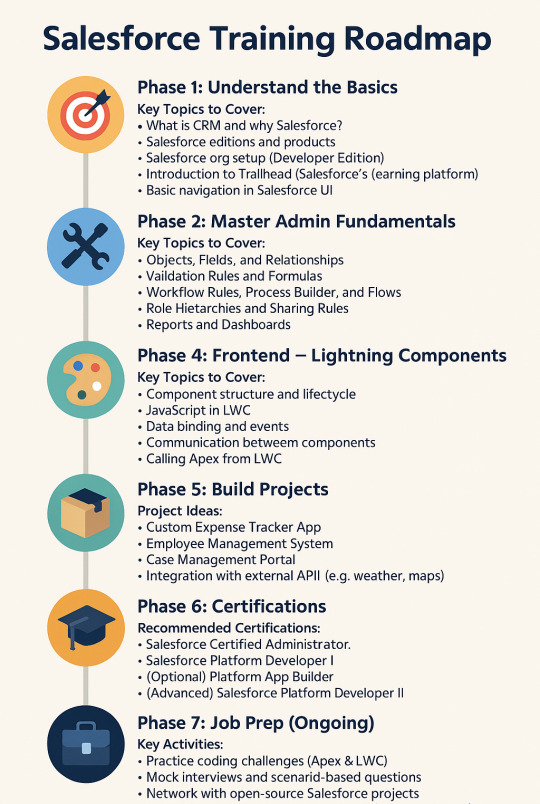
📍Your path to Salesforce mastery starts here! Whether you're aiming for your first certification or want to sharpen your advanced skills—our Salesforce Training Roadmap has got your back.
🎯 Roles Covered: ✅ Admin ✅ Developer ✅ Consultant ✅ Architect
#Salesforce #SalesforceTraining #Certifications #TechCareers #AdminLife #CRMExperts #CareerGoals #RoadmapToSuccess
0 notes
Text
Salesforce Certification Pyramid to Climbing the Career Ladder
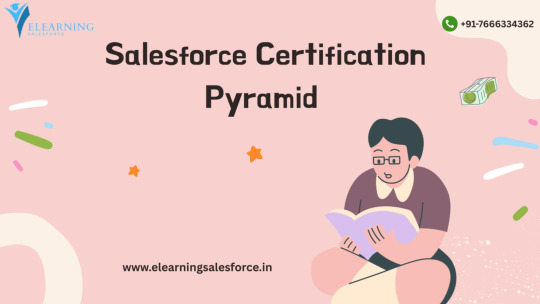
The Salesforce Certification Pyramid represents a structured path to mastering Salesforce, starting from foundational certifications like Salesforce Administrator, progressing to advanced roles like Developer, Consultant, and Architect. Each level builds your skills and credibility, helping you climb the career ladder in the Salesforce ecosystem.
0 notes
Text
Why Every Business Needs a Salesforce Developer: The Growing Demand for CRM Experts

Customer relationship management (CRM) is the backbone of modern business, and Salesforce is the most widely used CRM platform worldwide. As businesses rely more on Salesforce to streamline operations, the demand for Salesforce developers is skyrocketing. Companies across industries are actively searching for skilled professionals, creating a surge in career opportunities for those with Salesforce expertise.
With the tech talent gap growing, businesses are turning to technology solutions and USA recruitment agencies to find certified Salesforce professionals. But what makes this role essential, and why should IT professionals consider a career in Salesforce development?
The Rising Demand for Salesforce Developers
Salesforce is no longer just a sales tool—it’s an end-to-end business solution that integrates marketing, analytics, automation, and customer service. The need for skilled developers has surged due to:
Business Growth & Digital Transformation – Companies invest heavily in CRM to improve customer experience.
Customization Needs – Businesses require developers to tailor Salesforce features to their unique workflows.
Integration with Other Systems – Salesforce must connect seamlessly with third-party apps and databases.
Data Security & Compliance – Organizations need experts to configure secure and compliant CRM environments.
Because of these factors, technical recruiters in the US are constantly searching for Salesforce-certified professionals.
Career Opportunities in Salesforce Development
For job seekers looking to enter a high-demand field, Salesforce development offers:
Lucrative Salaries – Salesforce developers earn competitive salaries with opportunities for rapid career growth.
Global Demand – Skills in Salesforce are sought in the US job market and worldwide.
Diverse Career Paths – Professionals can specialize in roles like Salesforce Developer, Administrator, or Architect.
Remote & Flexible Work – Many businesses offer remote opportunities, making this a flexible career choice.
By leveraging IT recruitment services, professionals can connect with top employers looking for Salesforce expertise.
How Businesses Can Find the Right Salesforce Talent
With the increasing demand for CRM specialists, companies face challenges in hiring the right talent. That’s where USA job placement services come in, helping businesses find skilled Salesforce developers quickly. Companies can benefit from:
Access to Pre-Vetted Candidates – Saving time on recruitment.
Specialized Technical Hiring – Ensuring candidates have the proper certifications and experience.
Flexible Hiring Models – Contract, full-time, and remote staffing options.
Final Thoughts
As businesses continue to prioritize customer experience, the role of Salesforce developers will only grow. Whether you’re an IT professional looking for career growth or a company searching for top talent, technology staffing solutions and USA recruitment agencies can bridge the gap.
With Salesforce becoming a business necessity, hiring the right developers isn’t just an option—it’s a competitive advantage.
#employeeengagement#workplaceculture#hr consultancy#workforce#talent acquisition#employeeretention#workforcesolutions#data science
0 notes
Text
Learning Salesforce: Challenges and Opportunities
Introduction
Salesforce is one of the most powerful and widely used Customer Relationship Management (CRM) platforms. It plays a crucial role in business operations, enabling companies to streamline customer interactions, automate tasks, and analyze data effectively. As organizations increasingly adopt Salesforce, the demand for skilled professionals continues to grow. However, learning Salesforce comes with both challenges and opportunities. This blog explores what makes Salesforce both rewarding and challenging to learn and how you can leverage its opportunities for career growth.
For those looking to enhance their skills, Salesforce Online Training & Placement programs offer comprehensive education and job placement assistance, making it easier to master this tool and advance your career.

Challenges of Learning Salesforce
Wide Range of Features and Tools
Salesforce is not just a single tool but an extensive ecosystem of products, including Sales Cloud, Service Cloud, Marketing Cloud, Commerce Cloud, and more. Each product has its own functionalities, making it difficult for beginners to grasp everything at once.
Steep Learning Curve for Developers
While Salesforce administrators can manage many tasks without coding, developers need to learn Apex (Salesforce’s programming language) and SOQL (Salesforce Object Query Language) for deeper customizations. Understanding how to develop applications within the Salesforce platform requires time and technical skills.
Constant Updates and Changes
Salesforce releases updates three times a year, introducing new features and improvements. Keeping up with these updates requires continuous learning, making it challenging for users to stay current with the latest functionalities.
Certification Requirements
Salesforce certifications, such as Salesforce Administrator, Developer, and Consultant, are highly valued in the job market. However, preparing for these certifications requires dedication, hands-on practice, and a deep understanding of Salesforce concepts.
Opportunities in Learning Salesforce
High Demand for Salesforce Professionals
With businesses worldwide adopting Salesforce, there is a strong demand for Salesforce Administrators, Developers, Consultants, and Architects. Learning Salesforce can open doors to lucrative career opportunities in various industries.
Diverse Career Paths
Salesforce skills are applicable in multiple roles, including CRM administration, business analysis, project management, and software development. Whether you have a technical or non-technical background, there is a Salesforce career path for you.
Free and Accessible Learning Resources
Salesforce provides Trailhead, an interactive learning platform that offers free, hands-on training. Trailhead makes it easier for beginners to gain practical experience and earn credentials that showcase their expertise. With the aid of Best Online Training & Placement programs, which offer comprehensive training and job placement support to anyone looking to develop their talents, it’s easier to learn this tool and advance your career.
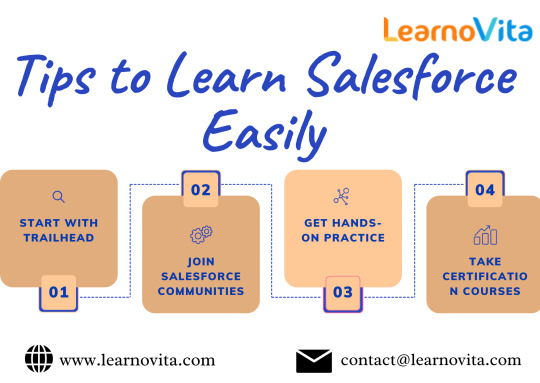
Work-from-Anywhere Opportunities
Since Salesforce is a cloud-based platform, many Salesforce-related jobs offer remote work flexibility. This allows professionals to work from different locations while collaborating with global teams.
How to Overcome Challenges and Succeed in Salesforce
Start with Trailhead – Use Salesforce’s free learning platform to gain hands-on experience and learn at your own pace.
Join Salesforce Communities – Participate in forums, LinkedIn groups, and local user groups to connect with experienced professionals.
Practice in a Developer Edition – Sign up for a free Salesforce Developer Edition to experiment with features and test configurations.
Take Online Courses – Enroll in structured Salesforce training programs to deepen your knowledge and prepare for certifications.
Earn Certifications – Certifications validate your skills and improve your job prospects in the competitive Salesforce job market.
Conclusion
Learning Salesforce presents challenges, such as mastering its vast feature set and staying updated with frequent changes. However, the opportunities it offers—such as high job demand, diverse career options, and free learning resources—make it a rewarding skill to acquire. With the right approach, dedication, and hands-on practice, anyone can overcome the challenges and build a successful career in Salesforce.
0 notes
Text
Learn Salesforce: Your Guide to Mastering the #1 CRM Platform

Salesforce is the world’s leading Customer Relationship Management (CRM) platform, empowering businesses to streamline their processes, boost productivity, and foster meaningful customer relationships. Whether you’re looking to break into the tech industry or enhance your existing skills, learning Salesforce offers numerous benefits. With its extensive use across industries, Salesforce proficiency can elevate your career trajectory and make you a highly desirable candidate in the job market.
Why Learn Salesforce?
The demand for Salesforce professionals is skyrocketing due to its widespread adoption. By understanding Salesforce, you’re setting yourself up to access lucrative job opportunities in roles such as Salesforce Administrator, Salesforce Developer, Salesforce Consultant, and Salesforce Architect. Let’s look at the core benefits of diving into the Salesforce ecosystem:
High-Demand Skills: Salesforce skills are highly sought after by companies globally.
Career Growth Opportunities: From entry-level to advanced roles, Salesforce expertise can lead to progressive career paths.
Flexible Job Market: Salesforce skills apply to multiple industries, from technology and finance to healthcare and retail.
Remote Work Potential: Many Salesforce roles offer remote working options, making it an attractive choice for work-life balance.
Top Searches Related to "Learn Salesforce"
The following keywords align with low keyword difficulty and high search volume, making them ideal for an SEO strategy focused on organic growth:
Salesforce for Beginners
Salesforce Administrator Certification
Salesforce Developer Training
Salesforce CRM Tutorial
Salesforce Lightning Training
Getting Started: Core Components of Salesforce
To learn Salesforce effectively, it's essential to understand its core components and modules, each offering unique functionalities.
Salesforce Sales Cloud: Aids in managing sales processes, tracking customer data, and automating tasks.
Service Cloud: Designed to enhance customer service, helping businesses provide personalized support.
Marketing Cloud: Focuses on marketing automation, customer journey mapping, and creating personalized marketing campaigns.
Salesforce Lightning: The latest UI that offers a modern and streamlined experience for users and administrators alike.
These components make Salesforce a comprehensive solution for customer relationship management, adaptable for diverse business needs.
Step-by-Step Guide to Learn Salesforce
Here is a clear path for beginners to learn Salesforce effectively:
Step 1: Familiarize Yourself with Salesforce Basics
As with any new software, start by exploring Salesforce’s user interface. Salesforce provides extensive learning materials, often accessible through Salesforce Trailhead, its official learning platform. Salesforce Trailhead is a free, gamified online platform where users can earn badges and learn at their own pace.
Step 2: Start with Salesforce Administrator Training
Salesforce Administrator Certification is often the starting point for Salesforce beginners. This certification provides foundational knowledge of the platform, including how to manage user data, security, and customization settings. Some popular topics covered in administrator training include:
User Management: Setting up user permissions, profiles, and roles.
Data Management: Configuring data models, object relationships, and data validation.
Security: Understanding profile-based permissions and role hierarchies.
Step 3: Learn Salesforce Development Skills
Once you’re comfortable with administrative functions, learning Salesforce Development is an excellent next step. Salesforce Developers work with Apex (Salesforce’s proprietary language) and Visualforce to create custom applications, workflows, and automated processes. Key areas to focus on for development include:
Apex Coding: Used for building custom logic and automation on the platform.
Visualforce and Lightning Components: Used for customizing user interfaces.
SOQL (Salesforce Object Query Language): Enables querying data stored within Salesforce.
Step 4: Explore Advanced Modules Like Salesforce Lightning
Salesforce Lightning is the platform’s advanced, highly responsive user interface. Learning Salesforce Lightning development will allow you to build interactive applications and components, enhancing your proficiency as a developer or consultant.
Step 5: Take the Salesforce Certification Exams
For each specialization—whether Salesforce Administrator, Salesforce Developer, or Salesforce Consultant—there are certification exams available. Holding certifications can significantly boost your resume, especially for competitive job positions.
Top Courses to Learn Salesforce
To help with your Salesforce learning journey, here are some recommended courses and resources that cover essential skills and prepare you for certification exams:
Salesforce Administrator Certification Prep: Aimed at beginners, this course covers fundamental topics and exam preparation.
Salesforce Development Masterclass: Dive into advanced Salesforce development topics, including Apex, Visualforce, and Lightning Components.
Salesforce Marketing Cloud Training: Designed for marketers who want to leverage Salesforce for building customer engagement campaigns.
Career Pathways in Salesforce
Salesforce Administrator: Manage user permissions, handle data, and maintain system integrity.
Salesforce Developer: Build and maintain custom applications on Salesforce using Apex and Visualforce.
Salesforce Consultant: Work with clients to understand their CRM needs and provide customized Salesforce solutions.
Salesforce Architect: Oversee complex Salesforce implementations, focusing on integration and scalable solutions.
Each role offers a unique set of challenges and benefits, making Salesforce a flexible career path.
Best Practices to Master Salesforce
Utilize Salesforce Trailhead: Salesforce’s free online learning platform offers structured paths for all levels.
Network with Other Salesforce Professionals: Joining groups like Salesforce Ohana helps in learning from others and staying updated on trends.
Hands-On Practice: Practice is essential to mastering Salesforce concepts. Many platforms offer Salesforce sandbox environments for real-world practice without affecting live data.
Stay Updated: Salesforce constantly updates its features, so staying informed on new updates is key.
Industry Applications of Salesforce
Salesforce skills are applicable across various industries:
Healthcare: Used for patient data management and service customization.
Retail: Assists in personalizing customer journeys and managing loyalty programs.
Financial Services: Facilitates relationship management and provides analytics for decision-making.
Nonprofits: Manages donor relations, streamlining donation tracking and volunteer management.
Preparing for Salesforce Certification Exams
Certification exams can be challenging, so structured preparation is crucial. Salesforce offers resources and practice tests for each certification. Some tips for effective preparation include:
Allocate Study Time: Salesforce certifications cover vast material, so consistent study sessions are essential.
Utilize Study Guides: Use official Salesforce study guides for structured preparation.
Take Practice Exams: Taking practice exams can help you get comfortable with the exam format and question types.
FAQs on Learning Salesforce
Q: How long does it take to learn Salesforce?
A: Depending on your schedule, it typically takes 1-3 months to gain a foundational understanding of Salesforce and prepare for the Salesforce Administrator certification.
Q: Is coding required to learn Salesforce?
A: No coding is required for Salesforce Administrator roles, but development roles require knowledge of Apex, Visualforce, and SOQL.
Q: Can I learn Salesforce for free?
A: Yes, Salesforce Trailhead offers free courses covering a range of topics from beginner to advanced levels.
Q: Which Salesforce certification is best for beginners?
A: The Salesforce Administrator Certification is ideal for beginners as it covers the platform’s fundamental aspects.
Conclusion: Your Salesforce Learning Journey Awaits
Embarking on your journey to Learn Salesforce can open doors to numerous career opportunities. With dedication, hands-on practice, and structured learning, you can master Salesforce and secure a valuable role in today’s tech landscape.
0 notes
Text
Maximize Your Earnings with Salesforce Certification

Let's talk about Salesforce certifications that hold the power to jump-start your career and maximize how much you can make. These credentials could genuinely make a world of difference, irrespective of your level of proficiency with Salesforce. Employers will be lining up to hire you, and I promise that they'll open up opportunities you never knew existed. Let's investigate the world of Salesforce certification courses!
Certification Tracks: Your Roadmap to Success
Salesforce comes with multiple certification paths, every single one which is meant for some specific function or set of skills. Think of these as your private road paths toward obtaining Salesforce certification. Below is an accessible summary:
Administrator
The Administrator route is your best choice if you're a connector that keeps an organization's Salesforce together. This certification highlights your abilities with Salesforce, from opening and running the system to ensuring the most tremendous user adoption.
2. Developer
If you have a love for coding, the Developer track is the perfect fit for you. Study how to modify and alter Salesforce's features using Visualforce, Apex, and numerous other tools. Developers with these certificates are rare gems on the job market, I promise you.
3. Consultant
Are you talented at fixing problems? You can show off the skills you have in creating and running Salesforce solutions that fuel company evolution by picking the Consultant path. Certified consultants develop delectable Salesforce recipes for their clients, similar to seasoned chefs.
4. Architect
The Architect route is the best possible choice if you're a design prodigy. Take an in-depth look into setting up and carrying out significant Salesforce installations that support a business's long-range objectives. Your peers will be enamored of you once you've earned these certificates.
5. Industry-specific
Salesforce follows through on every little thing. There are industry-specific certificates that display your competence in markets like financial services, healthcare, and many others.
Certification Levels: Climb the Ladder of Success
But wait, there's more! Salesforce certifications come in different levels, so you can keep leveling up your game:
Associate
Consider this the start of your 101 in Salesforce. Your basic concepts and skills are proven by the Associate-level certifications, which position you far above other candidates for Salesforce entry-level positions.
Professional
All set to move it up a notch? You can showcase your skill with complex Salesforce ideas and practical use by receiving one of the Professional-level certifications. Employers drool over individuals with these certificates.
Advanced
The advanced-level certificates are the highest certifications for Salesforce lovers. These qualifications highlight what it takes to lead vital Salesforce efforts and take on tough responsibilities. Get ready for a flood of job offers!
Career Opportunities: The Sky's the Limit
Now for the most thrilling part: soon after you have your Salesforce certifications under your belt, you can have access to a plethora of job prospects. Be prepared—there are limitless options!
Salesforce Consulting Firms
These are the most prominent players in the Salesforce universe. Possessing Salesforce integration consulting certificates will render you highly valued by consultancy organizations that deliver services related to Salesforce implementation, integration, and optimization.
2. Salesforce Implementation Partners
Think of these dependable helpers in the Salesforce world. Salesforce works closely with implementation partners to offer specific options for their client base. If you are holding the proper certificates, these teams will deem you to be an asset.
3. Salesforce Independent Consultants
Becoming a licensed Salesforce independent consultant is a viable career choice for those with an entrepreneurial drive. While costing top dollars, you'll be ready to pick the projects and clients you work on.
4. Salesforce AppExchange Partners
Akin to Salesforce's app store, AppExchange lets partners design modern apps that boost the platform's capability. Getting a Salesforce certification will make you a precious resource to these organizations, helping to foster the creation of creative items.
5. Salesforce ISVs
The hippest kids on the block, also known as Independent Software Vendors (ISVs), present unique Salesforce solutions and apps. You'll be an industry star and add to the direction of Salesforce innovation if you've got the appropriate credentials.
6. Salesforce Administrators
A Salesforce whisperer is needed for any firm, and capable Administrators are individuals who come in. To set up, preserve, and improve the Salesforce instance to make sure it behaves like an efficient device, you are going to be the go-to guy.
7. Salesforce Developers
Businesses will be fighting for your talent if you are an expert coder. The architects behind custom Salesforce solutions, which meet an organization's specific demands are Certified Developers.
Wrapping Up
Phew, that was quite an overview of the Salesforce certification courses! The bottom line is the fact you will be formidable if you have the proper credentials under your belt. Opportunities are bound to present themselves, doors will open, and the potential for earnings will rise. So, why do you delay? Select your certification path, and get prepared to take on the Salesforce universe!
#salesforce#salesforce development services#salesforce dynamic forms#salesforce technical debt#salesforce project management template
0 notes
Text
Overcoming Your Profession: An Overview of Salesforce Course Certification Training Programs
It is critical to stay ahead of the curve in the rapidly changing worlds of technology and business. In the context of Customer Relationship Management (CRM) software, this is especially true. Salesforce is a prominent player in the CRM market, providing robust solutions to optimize business operations and spur expansion. Getting certified in salesforce course is not only beneficial but frequently necessary for those who want to succeed in this sector. We'll look at the value of Salesforce certification training programs, the specifics of Salesforce courses, and the highly sought-after Salesforce Admin certification in this blog.
Salesforce Certification's Significance
Becoming certified by Salesforce has evolved to signify expertise within the Salesforce network. Be it an experienced professional or someone just starting out in their career, earning a Salesforce certification can greatly increase your credibility, improve your skill set, and lead to exciting new prospects. Why it matters is as follows:
Industry Recognition: Because Salesforce is extensively used in many different industries, having a Salesforce certification is a recognized credential worldwide. Because certified experts have a track record of using Salesforce to improve business outcomes, employers respect them.
Career Advancement: Your dedication to professional development and platform proficiency is demonstrated by your Salesforce certification. It can set you apart from the competition and put you in a position to grow in your company or on the job market.
Increased Skill Set: You'll obtain a comprehensive understanding of Salesforce products, best practices, and implementation techniques by enrolling in Salesforce certification training classes. These are transferable talents that can be used not only for your current position but also for other industries and job functions.
Greater Earning Potential: Salesforce professionals with certifications typically earn more money than their non-certified colleagues. Putting money into Salesforce certification training can increase your earning potential and provide long-term financial advantages.
Examining Courses for Salesforce Certification Training
Salesforce provides a wide variety of certification pathways to accommodate varying roles and levels of expertise. There is a certification path designed to meet your professional goals, regardless of your interests in technical implementation, customer service, sales, or marketing. Popular Salesforce certification courses include the following:
Salesforce Administrator: This qualification is perfect for individuals in charge of overseeing, setting up, and maximizing Salesforce setups. Basic ideas including user administration, security, customisation, and data management are covered in this course.
Salesforce Developer: This certification is designed for people who have experience with software development and concentrates on using the Salesforce platform to create bespoke applications and connectors. Apex programming, Visualforce, Lightning components, and API integration are among the topics covered.
Salesforce Sales Cloud Consultant: This certification, which is intended for sales professionals, places a strong emphasis on implementation skills for Salesforce Sales Cloud solutions. Analytics, lead management, opportunity monitoring, and sales automation are some of the subjects covered in this course.
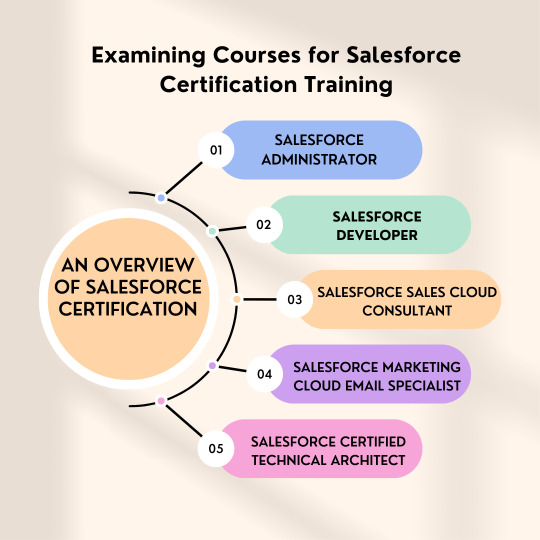
Salesforce Marketing Cloud Email Specialist: This certification, which is aimed at marketers and marketing automation experts, verifies competence in planning, creating, and implementing email marketing campaigns with Salesforce Marketing Cloud.
Salesforce Certified Technical Architect: Known as the highest of all Salesforce credentials, the Certified Technical Architect title is only awarded to professionals who are able to plan and execute intricate Salesforce solutions that support organizational goals.
Establish Specific Goals: Identify your professional goals and choose the Salesforce certification path that best fits your needs. Your learning path will be guided and you will remain motivated if you have a clear objective in mind.
Make Use of Resources
Make use of official Salesforce documentation, training materials, and online tools like Trailhead, the company's free learning environment. To strengthen your grasp of important concepts, add practice tests and practical experience to your studies.
Take Part in a Community: Participate in the active Salesforce community by using social media, user groups, and forums. Making connections with other professionals and exchanging ideas can improve your education and offer helpful assistance.
Practical Application: Utilize your knowledge in actual situations by working on projects or offering your assistance with Salesforce-related duties within your company. Having real-world experience helps you to cement your knowledge and abilities.
Keep Up with Updates and new features are constantly being added to the Salesforce platform. To keep your certification current, attend events, take part in webinars, and pursue continuing education to stay up to date on the latest advancements.
In summary
A symbol of competence and mastery in CRM technology, Salesforce certification has become increasingly important in today's competitive employment market. Through the purchase of Salesforce certification training courses and a dedicated pursuit of certification, you may improve your professional prospects, broaden your skill set, and establish yourself as a valuable member of the salesforce admin certification ecosystem. A gratifying path full of chances for professional progress and fulfilment awaits those who want to become certified Salesforce Administrators, Developers, Consultants, or Architects. With a Salesforce certification, start your journey to career mastery right now!
0 notes
Text
Salesforce Certification Guide at Apex Hours - Your Path to Success Unveiled
Unlock the secrets to Salesforce Certification success with Apex Hours! Delve into our comprehensive guide, packed with expert tips, resources, and insights to help you ace your certification exams. Whether you're aiming for Administrator, Developer, or Architect certifications, Apex Hours has you covered every step of the way.
0 notes
Text
MuleSoft Offerings

MuleSoft, a Salesforce company, offers a range of products and services designed to facilitate the integration of applications, data, and devices both within and outside of an organization. Its core offerings revolve around the Anypoint Platform, which provides a comprehensive suite of tools for building, managing, and deploying integrations and APIs. Here’s an overview of MuleSoft’s primary offerings:
Anypoint Platform
The Anypoint Platform is MuleSoft’s flagship product, offering a unified, flexible integration and API management platform that enables companies to realize their digital transformation initiatives. Its main components include:
Design and Development:
Anypoint Studio: An Eclipse-based IDE for designing and developing APIs and integration flows using the Mule runtime engine.
API Designer: A web-based tool for designing, documenting, and testing APIs using the RAML (RESTful API Modeling Language) or OAS (OpenAPI Specification).
API Management:
API Manager: Manages APIs’ lifecycle, including security, throttling, and versioning.
Anypoint API Community Manager: Engages API developers and partners by providing a customizable developer portal for discovering and testing APIs.
Runtime Services:
Mule Runtime Engine: A lightweight, scalable engine for running integrations and APIs, available both on-premises and in the cloud.
Anypoint Runtime Manager: A console for deploying, managing, and monitoring applications and APIs, regardless of where they run.
Connectivity:
Anypoint Connectors: A library of pre-built connectors that provide out-of-the-box connectivity to hundreds of systems, databases, APIs, and services.
DataWeave: A powerful data query and transformation language integrated with Anypoint Studio and the Mule runtime for handling complex data integration challenges.
Deployment Options:
CloudHub: A fully managed cloud platform for deploying and managing applications and APIs.
Anypoint Runtime Fabric: A container service for deploying Mule applications and APIs on-premises or in the cloud, supporting Docker and Kubernetes.
Anypoint Private Cloud: Enables companies to run Anypoint Platform in their own secure, private cloud environment.
Security and Governance:
Anypoint Security: Features to protect the application network and APIs from external threats and internal issues.
Anypoint Monitoring and Visualizer: Tools for monitoring API and integration health, performance, and usage, as well as visualizing the architecture and dependencies of application networks.
MuleSoft Composer
MuleSoft Composer is a more recent addition aimed at empowering non-developers to connect apps and data to Salesforce quickly without writing code. It provides a simple, guided user interface for integrating popular SaaS applications and automating workflows directly within the Salesforce interface.
Training and Certification
MuleSoft also offers comprehensive training, certification programs, and learning paths for developers, architects, and operations professionals. These resources help individuals and organizations build expertise in designing, developing, and managing integrations and APIs using MuleSoft’s Anypoint Platform.
Community and Support
MuleSoft Community: A vibrant community of developers and architects where members can ask questions, share knowledge, and contribute connectors.
MuleSoft Support: Professional support services from MuleSoft, including troubleshooting, technical guidance, and product assistance to ensure customer success with MuleSoft solutions.
Demo Day 1 Video:
youtube
You can find more information about Mulesoft in this Mulesoft Docs Link
Conclusion:
Unogeeks is the №1 Training Institute for Mulesoft Training. Anyone Disagree? Please drop in a comment
You can check out our other latest blogs on Mulesoft Training here — Mulesoft Blogs
You can check out our Best in Class Mulesoft Training details here — Mulesoft Training
Follow & Connect with us:
— — — — — — — — — — — -
For Training inquiries:
Call/Whatsapp: +91 73960 33555
Mail us at: [email protected]
Our Website ➜ https://unogeeks.com
Follow us:
Instagram: https://www.instagram.com/unogeeks
Facebook: https://www.facebook.com/UnogeeksSoftwareTrainingInstitute
Twitter: https://twitter.com/unogeeks
#MULESOFT #MULESOFTTARINING #UNOGEEKS #UNOGEEKS TRAINING
0 notes
Text
Trailblazing Your Career: The Power of a Salesforce Development Course

Introduction
Being ahead of the curve is crucial for job advancement in the quickly changing IT sector. Salesforce has become a pathfinder for individuals hoping to make a name for themselves in the customer relationship management (CRM) space. Salesforce provides individuals with several options to succeed in their jobs with its extensive applications and strong platform. One such path that has become more well-known is Salesforce development. This blog post will discuss the career-boosting potential of a Salesforce development course and its transforming effect.
The Growing Demand for Salesforce Developers:
As businesses increasingly leverage Salesforce to streamline their operations and enhance customer interactions, the demand for skilled Salesforce developers has surged. These professionals play a pivotal role in customizing and optimizing Salesforce applications to meet the unique needs of organizations. As a result, Salesforce development has become a hotbed for career opportunities, offering lucrative salaries and a diverse array of job roles.
Key Skills Developed in a Salesforce Development Course:
Apex Programming Language Mastery: Apex is the backbone of Salesforce development, allowing developers to create custom business logic and manipulate data. A comprehensive Salesforce development course delves into Apex programming, equipping participants with the skills needed to write powerful and efficient code.
Visualforce Page Development: Salesforce development courses often cover Visualforce, a framework that enables the creation of custom user interfaces. Learning how to design and implement Visualforce pages is crucial for tailoring the Salesforce user experience to specific organizational requirements.
Lightning Components: With the advent of Salesforce Lightning, a modern framework for building dynamic web applications, developers need to be proficient in creating Lightning components. A Salesforce development course guides participants through the intricacies of Lightning component development, enhancing their ability to craft responsive and intuitive user interfaces.
Integration Techniques: Salesforce rarely exists in isolation within an organization. Integration with other systems and platforms is a common necessity. A robust Salesforce development course imparts knowledge about various integration techniques, ensuring developers can seamlessly connect Salesforce with external applications and databases.
Debugging and Testing: Identifying and rectifying errors is a crucial skill for any developer. A Salesforce development course provides hands-on experience in debugging and testing, enabling participants to troubleshoot issues efficiently and ensure the reliability of their solutions.
Career Advancement Opportunities:
Completing a Salesforce development course not only equips you with technical skills but also positions you as a sought-after professional in the job market. Salesforce certifications, often achievable after such a course, add credibility to your profile and significantly enhance your employability. Whether you're an aspiring developer or an experienced professional looking to upskill, the knowledge gained from a Salesforce development course can open doors to roles such as Salesforce Developer, Technical Architect, or even Consultant.
Conclusion
In a digital era where businesses are continually seeking innovative solutions to enhance their customer interactions, a career in Salesforce development is a promising and rewarding choice. A Salesforce development course serves as a stepping stone to mastering the intricacies of this dynamic platform, allowing you to contribute meaningfully to the success of organizations. So, if you're looking to trailblaze your career in the tech industry, consider the transformative power of a Salesforce development course - your gateway to a world of opportunities and professional growth.
Ready to embark on your journey to becoming a proficient Salesforce developer? Elevate your skills and career prospects with LearNowx, a leading Salesforce training institute. Enroll in our comprehensive Salesforce development course today and gain hands-on experience in Apex programming, Visualforce, Lightning components, integration techniques, and more.
Don't miss the chance to position yourself as a sought-after Salesforce professional. Take the first step towards success - join LearNowx's Salesforce training institute and trailblaze your career in the exciting world of Salesforce development. Unlock a world of opportunities and watch your career soar to new heights!
0 notes
Text
Professional Salesforce Development Company
Breaking Down the Complexities of Salesforce Technologies: A Comprehensive Guide to Salesforce Vlocity
https://www.ivserve.com/assets/imgs/blog/blog-2/Breaking%20Down%20the%20Complexities%20of%20Salesforce%20Technologies-min.jpg
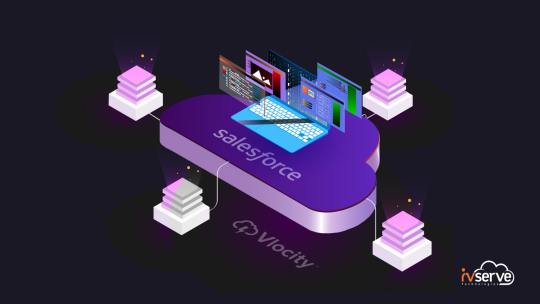
True to its name, Salesforce Vlocity adds velocity to any Salesforce Instance and speeds up operations. Most applicable for customer-centric industries, the cloud software finds wide applications in telecommunications, media and entertainment, energy and utilities, insurance and financial services, and the Government sector.
Why is Vlocity (Industries) A Sought-After Choice For Businesses?
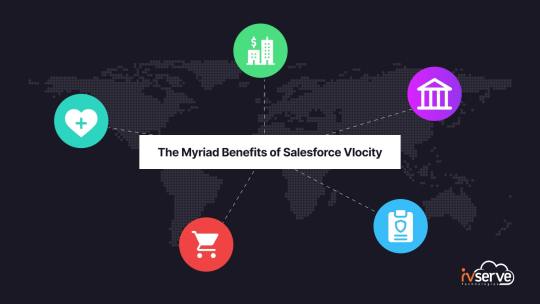
A Complete Industry Solution
Vlocity is a comprehensive and exhaustive industry solution for end-to-end sales process and works equally well for enhancing both B2B and B2C digital customer interactions.
Enhanced Agility
Clients have reported a major reduction in
time to market,
average Handling Time, and
quote to order time,
resulting in improved agility of both marketing and sales processes. Moreover, a unified customer experience across channels inspires customer trust in the brand, which is priceless.
Single Platform for Multiple Needs
Vlocity allows users to manage quotations, policy administration, claims management, and services in a single platform and offers one version of truth to all users.
Easy-to-Use and Configure
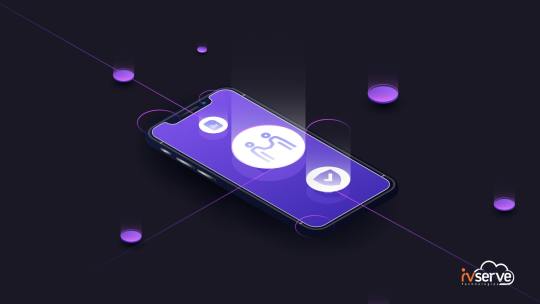
Vlocity achieves these feats owing to some of its futuristic features built by its developers. Here’re a few of the most useful features that make it indispensable.
Omniscript
Remember the last time you went shopping online? Your journey started from searching for the desired product, scanning through the list of available options, looking for discounts/product bundles, adding them to your cart, and finally payment and checkout. Now, this customer journey has been created by someone at the backend using Omniscript in Vlocity on Salesforce. Similarly, users can create any number of business processes as guided paths using the Omniscript tool, all the while keeping customer experience at the core. And the best thing about Omniscript is its wide applicability. From a community portal to an e-commerce website, from a button click to a form submission, from websites to mobile applications, the feature can be used just about anywhere!
Data Raptor
Another feather in Vlocity’s cap, the Dataraptor tool, allows users to manage large volumes of disparate datasets without writing codes or queries (how we all hate it!). Imagine yourself as a product owner in a large telecom firm with access to customer, vendor, agents, and a large number of other datasets. Having to manage such a large volume of data can be quite a hassle. But that’s not quite so if you have the Data Raptor working in the background. The feature manages, fetches, saves, downloads, and even transforms your Salesforce data with the point and click functionality and you will be free from the trouble of writing codes or queries for the same task. And, that’s how Vlocity simplifies data management to a level that it can be adopted even by non-technical users.
Flex Cards
Flex cards allow users to build UI components and applications on the Salesforce platform and beyond. The component contains a combination of data and links to processes within a specific context based on the data source. A FlexCard is designed to loop through records and return from its data source and display the list of records in containers called cards.
Other Features
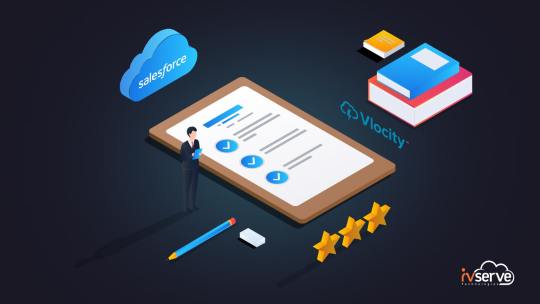
While loading Vlocity and getting Salesforce up and running is a breeze as compared to conventional methods of implementation, it still needs an experienced hand and a certified-developer. Developers can get themselves certified with one or all of the industry certifications and work on developing Vlocity solutions as certified professionals. At iVServe, we deliver managed Salesforce Implementation through our team of Salesforce developers, architects, and administrators who come with, at least, one or more of the following industry certifications:
Salesforce Certified Omnistudio Developer Credential
Salesforce Certified Industries CPQ Developer Credential
Salesforce Certified OmniStudio Consultants Credential
Using these skills and the experience gained in implementing Salesforce implementation through Vlocity for different industry verticals, our experts ensure a smooth adoption of the Salesforce instance that enables businesses to achieve their goals in reduced cost, time, and effort. If you’re still struggling to optimize and use your Salesforce instance without much headway, feel free to connect with us, and our experts will figure the way forward for you.
For info visit us
https://www.ivserve.com/salesforce-development-company
1 note
·
View note
Text
Are Salesforce Certifications Worth It?

Are Salesforce Certifications Worth It?
Yes, Salesforce certifications are definitely worth it, especially if you’re planning a career in cloud computing, CRM, or enterprise solutions. These certifications validate your skills, enhance your professional credibility, and open doors to high-demand roles such as Salesforce Administrator, Developer, Consultant, or Architect.
Whether you’re a fresher or an experienced professional, getting certified:
Boosts your resume visibility
Increases your chances of getting hired or promoted
Helps you stand out in a competitive job market
Gives you access to a large and growing Salesforce ecosystem
With companies across industries adopting Salesforce, certified professionals are in high demand globally, and the certification paths are designed to match both technical and non-technical roles.
0 notes
Text
The Benefits of a Salesforce Developer Career
In the fast-paced world of technology, businesses are constantly seeking innovative solutions to enhance customer relationships and streamline operations. Salesforce, the world’s leading customer relationship management (CRM) platform, has become a key player in this space. For those looking to enhance their skills, Salesforce Online Training & Placement programs offer comprehensive education and job placement assistance, making it easier to master this tool and advance your career.

As a result, the demand for skilled Salesforce developers has skyrocketed, making it a lucrative and rewarding career choice. Whether you're just starting in tech or looking for a career switch, becoming a Salesforce developer offers numerous benefits.
High Demand and Job Security
Salesforce is used by thousands of companies across industries, from small startups to Fortune 500 corporations. With businesses increasingly relying on Salesforce for automation, data management, and customer engagement, the demand for skilled developers continues to grow. This ensures job stability and long-term career prospects in a constantly evolving tech landscape.
Attractive Salary Packages
A career as a Salesforce developer is financially rewarding. Even at an entry level, developers earn competitive salaries, and with experience, the earning potential increases significantly. Certified Salesforce professionals often command higher salaries, making it a lucrative career choice. As you advance in your career, you can transition into roles such as Salesforce consultant, architect, or technical lead, further increasing your income potential.
No Extensive Coding Experience Required
Unlike many software development roles that require proficiency in multiple programming languages, Salesforce development is relatively easier to learn. While knowledge of Apex (Salesforce’s programming language) and JavaScript is beneficial, beginners can start without prior coding experience. Salesforce provides a free learning platform called Trailhead, where aspiring developers can gain hands-on experience through interactive modules and guided training. With the aid of Best Online Training & Placement programs, which offer comprehensive training and job placement support to anyone looking to develop their talents, it’s easier to learn this tool and advance your career.
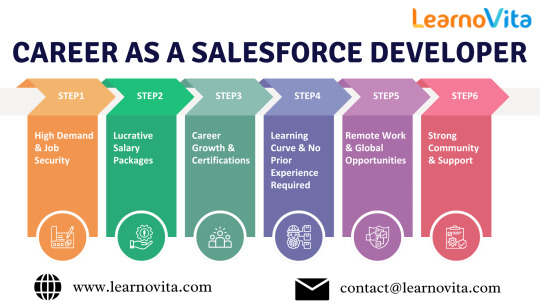
Flexible Work Environment
One of the biggest advantages of a Salesforce developer career is flexibility. Since Salesforce is a cloud-based platform, many companies offer remote work opportunities. Developers can work from anywhere, allowing for a better work-life balance. Whether you prefer freelancing, full-time employment, or contract-based work, Salesforce development provides options to suit different career preferences.
Globally Recognized Certifications
Salesforce offers various certifications that validate a developer’s expertise and boost career growth. Some of the most sought-after certifications include:
Salesforce Platform Developer I & II
Salesforce Administrator
Salesforce App Builder
Salesforce Technical Architect
These certifications enhance your credibility, improve job prospects, and increase earning potential. Since Salesforce is a globally recognized platform, these certifications open doors to job opportunities across different countries and industries.
Career Growth and Specialization Opportunities
Salesforce development offers a clear career path with multiple specialization options. Developers can expand their skill set and move into higher roles such as:
Salesforce Consultant: Advising businesses on best practices for Salesforce implementation.
Salesforce Architect: Designing advanced Salesforce solutions for complex business needs.
Salesforce Project Manager: Leading teams in Salesforce project execution.
The opportunity to specialize and advance in different areas makes Salesforce development a dynamic and future-proof career.
Strong Community Support and Networking
Salesforce has a vast and active community of developers, administrators, and consultants. The ecosystem is highly supportive, with forums, user groups, and events like Dreamforce that provide opportunities for learning, networking, and professional growth. Being part of this community allows developers to stay updated with the latest industry trends and collaborate with experts worldwide.
Continuous Learning and Innovation
Salesforce is a constantly evolving platform, introducing new features and updates regularly. This keeps the job exciting and ensures developers are always learning and adapting to new technologies. For those who enjoy problem-solving and working on innovative solutions, Salesforce development provides an engaging and intellectually stimulating career.
Conclusion
A career as a Salesforce developer comes with numerous benefits, including high demand, job security, competitive salaries, and flexible work opportunities. With free learning resources, industry-recognized certifications, and a strong community, it is an excellent choice for anyone looking to build a successful career in technology.
If you're considering this career path, start exploring Salesforce Trailhead today and take the first step toward an exciting and rewarding future in Salesforce development.
0 notes